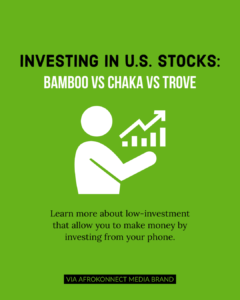In this article we are going to compare Trove vs Bamboo vs Chaka, then you decide which is best for you to invest in US stocks. Now you can invest in overseas stocks and shares from Nigeria, Ghana, South Africa, Kenya, amongst others, thanks to the online digital investing businesses that are out there, removing the stress that you would have to go through if you were to use a foreign broker,
Before now, you’ll require large account opening fees and a lengthy registration process. Trove, Chaka and Bamboo are now two of the most well-known digital investment businesses in the African market. In this comparison of Trove, Chaka and Bamboo, you will find out which of these platforms is ideal for you to use when it comes to investing in international stocks, we will analyze based on some of the most important characteristics of each.
Trove vs. Chaka vs. Bamboo: At a Glance
You may start investing in American, Chinese, and Nigerian stocks, bonds, and ETFs for as little as 1,000 using Trove, which is a reliable and secure online trading platform. Using Bamboo, Nigerians may trade American equities in a secure and convenient online environment. The business has just made the announcement that its customers will soon have the opportunity to invest in Nigerian equities as well.
Comparing Trove with Bamboo in Terms of Their Features and Availability
The usability and feature sets of Trove and Bamboo are quite comparable to one another. However there are a few significant variations between the two. The platform trading costs, charges, and minimum investment amount are some examples of the ways in which Trove and Bamboo vary.
Comparing the Market Fees and Charges of Trove and Bamboo
In terms of the costs associated with making trades, both Trove and Bamboo offer rates that are reasonable; Nonetheless, there are significant variances between the two that may sway your choice in the competition between Trove and Bamboo.
Trading Fees
-
Trove
Trove’s platform supports not one, but two different wallets. Wallets in both Naira and Dollars Wallets denominated in naira are used for making investments in the Nigerian stock market, whilst dollar wallets are utilized for making investments in equities listed in other countries.
Every time you purchase or sell stocks using your dollar wallet, Trove will charge you a commission of 1%, with a minimum fee of $2. Naira wallet traders pay a 0.30 percent Securities and Exchange Commission charge, There is a 4.20 naira for a CSCS Trade Alert, 5 percent value-added tax on all NSE, SEC, and broker commissions. Fees for the platform, stamp duty, and brokerage all come in at 1.35 percent.
-
Bamboo
Bamboo also has a dollar wallet and naira wallet. When you buy and sell US equities on its platform, it levies a cost of 1.5% on each transaction.
Fees for the Deposit
-
Trove
You will be charged a fee by trove, Chaka and Bamboo in order to deposit money into your accounts on their respective platforms. When you fund your Trove account with a credit or debit card, You will be charged a fee of 1.5% plus 100 for any transaction that is over 2,500. This is applicable for wallets containing either Naira or Dollars, There is no fee associated with using bank transfers to fund or withdraw money from your (Naira or Dollar) wallet.
-
Bamboo
If you want to fund your Bamboo account using a Naira Card, There is a 1.4% fee associated with this method. A Naira card has a maximum charge of 2000 that may be placed on it. There is a one-time fee of N150 associated with bank transfers, this is regardless of the total amount of the deposit. If you choose to fund your Bamboo account with a USD card, you will incur a fee of 2.9% of the total amount of the transaction. On Bamboo, there is no fee associated with making a wire transfer in USD. However, your bank can assess you a fee for this transaction. You will be required to pay a fee of 1.4% of the money that you deposit in order to utilize the Barter app that is offered by Flutterwave.
Minimum Trove and Bamboo investment amounts
One of the advantages of using platforms like as Trove, Chaka and Bamboo is that they make it possible for you to invest in international companies, without even requiring you to begin with a significant amount of capital. On their website, Trove enables anybody to buy in stocks for as little as 1000, Bamboo has a minimum investment amount of $20.
Financial Security in Relation to Trove and Bamboo
Trove and Bamboo both use 256-bit encryption to guarantee that your personal information is secure. Both of them implement security on par with that of a modern banking institution. A maximum of $500,000 (or $250,000 for cash claims) is available in protection for each Trading account on Trove. Each trading account with Bamboo is protected up to a maximum of $500,000.
Bamboo app automatically logs you out of your account whenever you exit the app and asks you to input your pin before it would let you access your Bamboo account again. On the other hand, your session will remain active inside the Trove app until you manually logout. This provides Bamboo with an additional layer of protection in comparison to Trove.
Criteria for Choosing Between Trove and Bamboo
When comparing Trove to another platform, like Bamboo, you’ll find many similarities. The primary point of difference between them is their pricing models and maybe the quality of the app’s user experience if you’re someone that likes to check your account daily. The Bamboo light design is clean, streamlined, and it makes it simple to use the app. In contrast, the Trove dark theme draws your attention to the content of the app so that you can fully concentrate on it.
Which one, Trove or Bamboo, is better suited to your needs?
As a result of this comparison between Trove and Bamboo, you are now familiar with the primary capabilities of each software. If you have not yet selected the mobile application that best suits your needs. Don’t worry about it; we’ll choose a winner based on a few other criteria. For instance, you may begin investing in international shares with as little as N1,000 if you use the Trove app. Trove comes out ahead of Bamboo in this area by a very little margin when it comes to avoiding paying hefty trading and deposit fees.
If the minimum sums or trading costs aren’t a worry for you, but you are more worried about the safety of your investments. When it comes to determining which platform offers the highest level of protection, Bamboo comes out on top. So, now that we’ve put Bamboo vs Trove side by side, it is time to add Chaka to the conversation
What Is the Best Way to Invest in U.S. Stocks: Bamboo, Chaka, or Trove?

The following is a brief effort at providing an impartial analysis of online trading platforms i.e Trove, Bamboo and Chaka, we will look at the customer service, user experience, exchange rates, processing delays, and commission offered by these trading platforms.
Trove vs Bamboo vs Chaka:
Assistance to Customers
Robotic and automated customer care is a long way from being able to provide consumers with the individualized attention they want, especially for a product that deals with a real-time service (the stock market) in an industry that is known for it’s sensitivity. “Why hasn’t my wallet been charged with the purchase I made during the last day and why didn’t my transaction go through?” These are only a few examples of the numerous questions that call for human interaction.
After speaking personally with representatives from the customer care departments of these platforms, Bamboo is clearly in the lead. It has never been necessary for me to take my complaints farther than the in-app chat. The customer care team at Bamboo deserves praise for how quickly they respond to inquiries and how attentive they are. The behavior of Chaka is quite disturbing according to what I read online, they use canned replies and are difficult to get in touch with.
Summarily: Bamboo > Trove > Chaka
Trove vs Bamboo vs Chaka:
Regarding User Experience
Many different pieces of data must be shown for each stock, they must adapt to whether or not the stock is held in the investor’s portfolio. ”What was the cost of my purchase? Where do I stand now, in terms of making a profit or a loss, and by what percentage?” All these information needs to be accessible easily by an investor directly from their app, because how they are prioritized will have a significant impact on the success or failure of your trading decisions, particularly in the near term.
-
Trove vs Bamboo vs Chaka user experience
The user experience of Trove used to be bad, but their most recent redesign is excellent, Bamboo’s interface is attractive, but it’s daily app crashes raise many worries, the design of Chaka needs more development, since it more closely resembles a responsive webpage than a real app and the search never turns up any results. However, Chaka offers the best features, such as a personal portfolio chart; Nonetheless, their overall design needs a little more effort to be improved so that consumers can locate items more easily.
Summarily: Bamboo > Chaka > Trove
RECOMMENDED:
- Top 10 Money Making Apps: Legit Apps that pays you real money
- Best Money Transfer Apps and Platforms (TOP 10)
- Investment Visa and Best Investment Apps for Beginners with no experience
Trove vs Bamboo vs Chaka:
Exchange rates
The majority of individuals will need to deposit Naira, Cedi, Shilling or Rand depending on their country, in order to convert their currency into USD before they can trade U.S. equities. There are two sides to these: firstly, the amount of USD the platform is ready to sell to you in exchange for your currency deposit, Secondly, the exchange rate that will be used in the transaction.
Chaka is clearly in the lead in each of these categories, but only Bamboo gives you the ability to transfer your money to a USD account. They’ve had the cheapest USD/NGN exchange rate for the last three months, which should translate to the cheapest USD/NGN withdrawal rate for you.
All of them will take wire transfers, but as of the time of this writing, only Bamboo and Chaka would let you fill your account using a USD credit or debit card. Since the difference between their buy and sell prices is not much, they may all be seen as roughly equivalent.
Summarily: Chaka > Trove > Bamboo.
Trove vs Bamboo vs Chaka:
Timelines for Processing
Either you’ve realized enough of a profit on the stock to justify selling, or you’re ready to move on to other investments. On Bamboo, the movement of deposits and sales will look like this in a typical transaction. If you make a deposit of NGN on Monday, you will get value on Tuesday. If you acquire stocks on Tuesday and sell them on Thursday, you will receive value on Monday. When you make a profit and withdraw it on Monday, you will receive value the following Monday.
Bamboo is having significant delays in processing times. If you are a trader who focuses on short-term investments, you will most certainly get frustrated. You will get value for Chaka and Trove as soon as you sell them, but it is possible that you may not be able to withdraw your funds until after two or three days have passed. Trove is now rated higher than Chaka in my opinion because of the fact that Trove’s schedule for completing NGN to USD transactions is the quickest.
Summarily: Trove > Chaka > Bamboo
Trove, Bamboo or Chaka: Which is best for you
Trove vs Bamboo vs Chaka: Conclusion
You need to create a Trove account, Bamboo or a Chaka account in other to start investing, when you purchase or sell stocks with Bamboo, you are subject to a 1.5% commission fee. When you purchase or sell stocks for more than $200 through Trove, you will be subject to a 1% commission fee. A flat $2 fee is added to every amount that is less than $200. When you purchase or sell stocks for more over $200 via Chaka, you are subject to a 1% commission fee also.
A flat $2 fee is added to every amount that is less than $200. If you want to make trades worth more than $200, using Trove and Chaka will save you a significant amount of money in transaction costs. Bamboo can be a better option for you if your daily trade volume is going to be less than $200. We honestly hope this article was helpful to you in any way, let us know what you think via the comment section.















